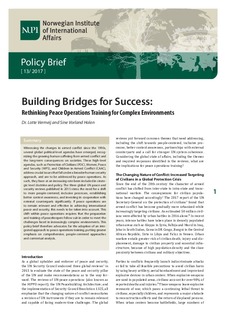Building Bridges for Success: Rethinking Peace Operations Training for Complex Environments
Research report
Published version
Permanent lenke
http://hdl.handle.net/11250/2466715Utgivelsesdato
2017Metadata
Vis full innførselSamlinger
- Artikler [251]
- Publikasjoner fra Cristin - FHS [182]
Sammendrag
Witnessing the changes in armed conflict since the 1990s, several global political-level agendas have emerged, recognizing the growing human suffering from armed conflict and the long-term consequences on societies. These high-level agendas, such as Protection of Civilians (POC), Women, Peace and Security (WPS), and Children in Armed Conflict (CAAC), address crucial issues that fall under a broader human security approach, and are to be addressed by peace operations. As such, they have at an increasing rate been included in strategic level doctrine and policy. The three global UN peace and security reviews published in 2015 stress the need for a shift to more people-centered, inclusive processes, establishing better context awareness, and investing in cooperation with external counterparts significantly. If peace operations are to remain relevant and effective in achieving international peace and security, this needs to be taken into account. This shift within peace operations requires that the preparation and training of peacekeepers follow suit in order to meet the challenges faced in increasingly complex environments. This policy brief therefore advocates for the adoption of an integrated approach to peace operations training, putting greater emphasis on comprehensive, people-centered approaches and contextual analysis.
